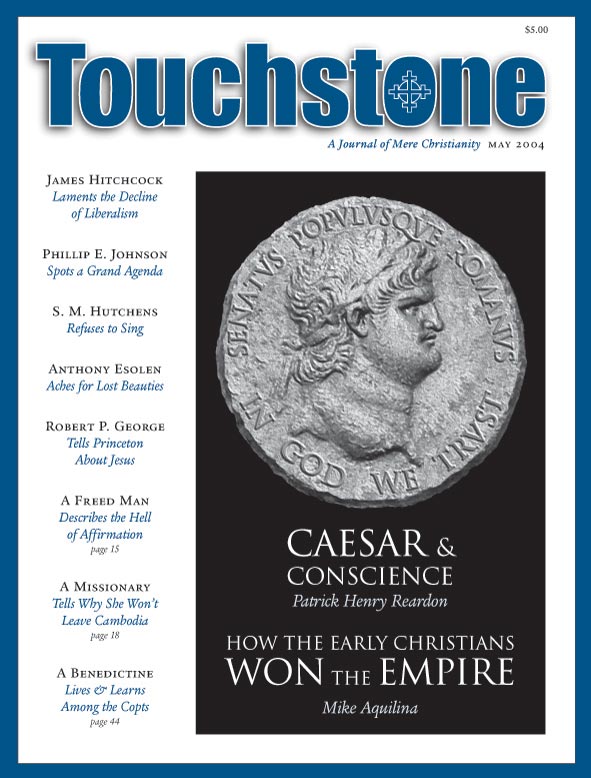Caesar & Conscience
Long accustomed to the thesis that governments derive their just powers from the consent of the governed, it is not easy for Americans to think that governments may also speak with a higher authority. Indeed, the “consent of the governed” is so commonly withheld these days that it may pass as part of our birthright.
For the same reason, it is difficult for Americans to believe that the art of government has any necessary relationship to a higher order at all, such as the order of the moral law. So clearly have we come to distinguish legal concerns from moral concerns that a real separation of the two is pretty much taken for granted. Anyone today who says that “you can’t legislate morality” is understood to be voicing a truism.
We may seem terribly bold, therefore, when we say that we politely disagree with this perspective. We do so, nonetheless, and we do so for the sake of what the Bible tells us.
The Christian submits to civil authority, St. Paul says, not only because civil authority has the power to exact that submission, but also “for the sake of conscience” (Romans 13:5). In view of Paul’s high respect for conscience, his assertion that submission to civil authority is a conscientious concern is truly remarkable.
Conscience (syneidesis), a word that Paul uses seventeen times in his epistles, refers to man’s inner light, the faculty by which he discerns moral differences and directs his ethical decisions. Paul’s use of this word contains, in addition, the sense of “consciousness” and pertains to the reflecting self-possession of the moral person (Romans 2:15; 2 Corinthians 1:12). It designates the critical moral discourse that man conducts within his mind (synoida). It refers to his human intentionality, his transcendent capacity as a conscious moral agent.
The Christian’s conscience, therefore, is the necessary and inseparable companion of his faith. It is to man’s conscience, his reflective faculty of cognitive intention, that the gospel itself is addressed (2 Corinthians 4:4; 5:11), and it is conscience that receives the witness of the Holy Spirit (Romans 9:1).
When Paul appeals, therefore, to the conscience with regard to civil authority, he exalts political responsibility to a very high order, recognizing that the Christian stands within a social context of grave and radical obligations. For the Christian, that is to say, political responsibility, including civil obedience, is not optional. He can flee from the responsibilities of the political order no more than he can abandon his own humanity, for the first are necessary components of the second.
For this reason also, man’s relationship to civil authority has to do with his relationship to God. It pertains to those essential matters about which every conscience is finally answerable to the Judge of history. Although the things of Caesar are not to be confused with the things of God, God himself requires that to Caesar be rendered his due, and that conscientiously.
Consequently, disobedience to civil authority is no light thing and never warranted except for the sake of conscience itself. What is commonly called “civil disobedience,” therefore, must not degenerate into a form of political fun and games. It is a very serious undertaking, and in order to be morally legitimate, such disobedience must express a stern dictate of conscience and never be employed simply as a mechanism of political influence. Christian history provides the most obvious examples of conscientious disobedience in the lives and deaths of the martyrs, who refused to put Caesar in the place of God.
For all that, Caesar appears to stand—if one may say so—uncommonly high, at least in the eyes of St. Paul. He is called “God’s servant,” and, in principle, whoever resists Caesar “resists what God has appointed.” Those who do so, moreover, “will incur judgment” (Romans 13:2,4). We do well to remember that the “Caesar” under discussion here in Romans was Nero, and that these lines were penned by a man that Nero put to death.
Government’s proper maintenance and sanctioning of civil life, then, precisely because it relies on and serves the moral order, properly addresses the Christian’s conscience. It is significant that both times when Paul uses the word “conscience” in the Acts of the Apostles, he does so in a judicial context, once before the Sanhedrin (23:1) and once before a Roman governor (24:16).
Patrick Henry Reardon is pastor emeritus of All Saints Antiochian Orthodox Church in Chicago, Illinois, and the author of numerous books, including, most recently, Out of Step with God: Orthodox Christian Reflections on the Book of Numbers (Ancient Faith Publishing, 2019).
bulk subscriptions
Order Touchstone subscriptions in bulk and save $10 per sub! Each subscription includes 6 issues of Touchstone plus full online access to touchstonemag.com—including archives, videos, and pdf downloads of recent issues for only $29.95 each! Great for churches or study groups.
Transactions will be processed on a secure server.
more from the online archives
calling all readers
Please Donate
"There are magazines worth reading but few worth saving . . . Touchstone is just such a magazine."
—Alice von Hildebrand
"Here we do not concede one square millimeter of territory to falsehood, folly, contemporary sentimentality, or fashion. We speak the truth, and let God be our judge. . . . Touchstone is the one committedly Christian conservative journal."
—Anthony Esolen, Touchstone senior editor











